A Conversation with Bruce Duffie
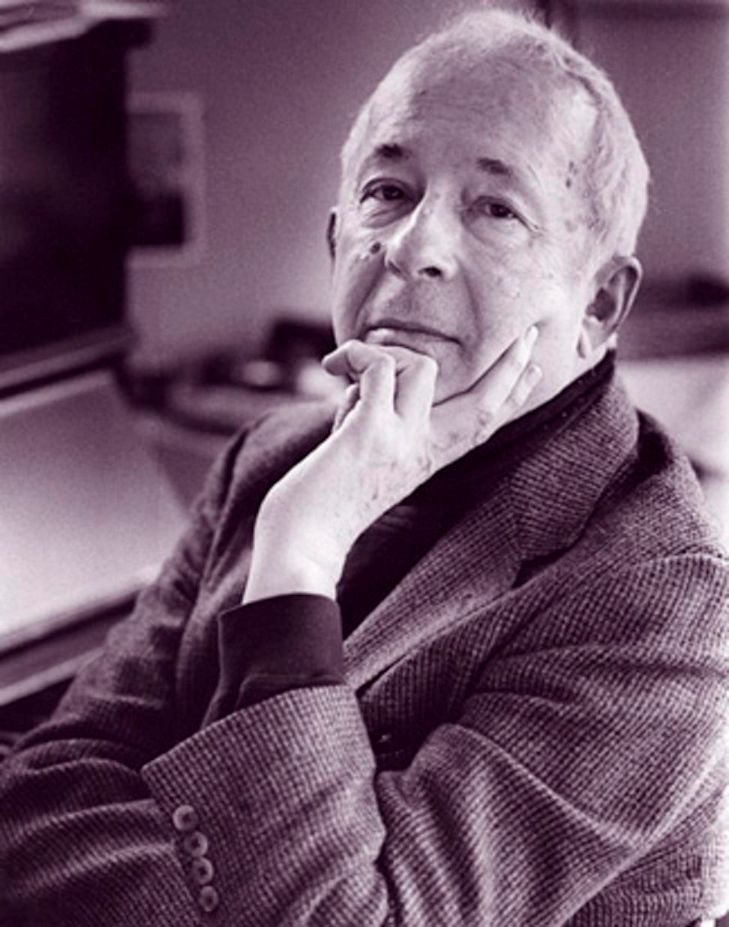

| Douglas Allanbrook
(April 1, 1921 - January 29, 2003) was an internationally known musician
and composer who had taught at St. John's College for 50 years. During a prolific career, Allanbrook maintained an energetic series of annual solo piano and harpsichord performances. His compositions included seven symphonies, several large choral works including a Mass, four string quartets, chamber works, and two operas, Nightmare Abbey and Ethan Frome. Leading American and European orchestras and chamber groups that have performed his works include the Baltimore Symphony Orchestra, Annapolis Brass Quintet, National Symphony Orchestra, Stuttgart Philharmonic and Munich Radio Orchestra. Born and raised in Melrose, Mass., Allanbrook began studying piano at age 8, and within two years was playing Bach, Haydn and Czerny. He composed his first symphony, On the Death of a Beautiful White Cat, as a teen-ager. After graduating from high school, Allanbrook taught music at a private girls school in Providence, R.I. He also began studying in Cambridge, Mass., with Nadia Boulanger. Drafted into the Army in 1942, he served as an infantryman with the 88th Division in the Italian campaign. His 1998 book, See Naples: A Memoir of Love, Peace and War in Italy, published by Houghton Mifflin, recounted his wartime experiences in which his division suffered a 75 percent casualty rate. Discharged with the rank of sergeant and decorated with a Bronze Star, he enrolled at Harvard College, where he continued to compose and studied with Walter Piston. He earned his bachelor's degree in 1948. As a Traveling Fellow of Harvard University from 1948 to 1950, he resumed his composition studies with Ms. Boulanger in Paris. He was a Fulbright Fellow from 1950 to 1952, and studied the harpsichord in Italy at the Conservatorio San Pietro a Majello. In 1952, he joined the faculty of St. John's in Annapolis. In addition to composing and performing as a harpsichordist, he taught music, Greek, French, mathematics and philosophy. At the time of his death, he was semiretired. "He was a man of the world who was very cosmopolitan," said Harvey M. Flaumenhaft, St. John's Dean and friend of 35 years. "He also played a great role in the social and cultural life of the college. He counted among his friends those who were prominent in writing, literature, and music in this country and abroad." In addition to his work at St. John's, he taught theory and counterpoint part time at the Peabody Conservatory of Music. A 1995 article in the Harvard University Gazette described him as a "fluent composer with a sharp ear for color and a bold style that manages to be both dramatic and subtly nuanced. His music is vivid, imaginative and intensely expressive." "Doug was an absolutely extraordinary teacher," said a former student, harpsichordist Richard Rephann of Mount Carmel, Conn., a member of the faculty of the Yale School of Music and director of the Yale Collection of Musical Instruments. "I'm a different person for having studied with him." Allanbrook, who was scheduled to give a harpsichord concert at Yale in April, continued to maintain a vigorous concert schedule. "When he played, he played with an intelligence that did not preclude passion. For Douglas, music was akin to breathing," said Elliott Zuckerman, a longtime friend who has been teaching at St. John's since 1961. He was 6 feet tall and wore sport coats, ties and a broad-brimmed brown hat. In his book-crammed study with its black, upright Yamaha piano, on which sprawled his white cat, he read and composed. Allanbrook was a member of the board of directors of Yaddo, the distinguished artists' community in Saratoga, N.Y. His marriages to Candida Curcio and Wye Jamison ended in divorce. Allanbrook is survived by sons Timothy Allanbrook of New York and John Vincent Allanbrook of Oakland, Calif.; a sister, Jean Burns of Exeter, N.H.; and two granddaughters. |
WorksDRAMATIC: Opera: Ethan Frome, after Edith Wharton (1950–52); Nightmare Abbey, after Thomas Love Peacock (1960–62). ORCH.: Trionfo d’Amore, overture (1949–50); Harpsichord Concerto (1950); Concert Music for Cello and Strings (1951–53); Triumph of Reason, overture (1955); Violin Concerto (1958); 7 syms. (1960, 1962, 1967, 1970, 1976, 1977, 1980); Serenade for Piano and Orch. (1982). CHAMBER: Partita for Cello (1955); 4 string quartets (1955; 1956–57; 1958; 1972); Fantasy for Violin and Piano (1956); Set of Passions for Violin and Harpsichord (1959); Game for Two for Piano and Percussion (1973); Night and Morning Music for Brass Quintet (1977); Invitation to the Sideshow for Brass Quintet (1980); Marches for the Quick and the Dead for Brass Quintet (1982); Quintet for Oboe, Clarinet, Violin, Viola, and Cello (1984); Commencement Exercises for Brass Quintet (1985); 25 Building Blocks for Horn and Piano (1985); Seven for Seven for Brass Quintet, Piano, and Percussion (1987); String Quintet (1989). KEYBOARD: Piano: 2 sonatas (1947, 1949); Songs Without Words (1951); Bagatelles (1964); Forty Changes (1965); Preludes for All Seasons (1970); Venice Music (1974); Naples Music (1975); Transcendental Studies (1978); Night Pieces (1983–85); New American Preludes (1990). Harpsichord: Little Sonatas (1949); Fantasy for 2 Harpsichords (1963); Studies in Black and White (1971). Organ: Ricercare (1963). VOCAL: Te Deum for Chorus, Flute, Brass, Harp, 2 Pianos, and Percussion (1942); Mass for Chorus (1946); Ash Wednesday for Soprano, Chorus, and Orch. (1947); Psalms 130 and 131 for Chorus and Organ (1955); Seven Last Words for Mezzo-soprano, Baritone, Chorus, and Orch. (1970); American Miscellany for Chorus (1973); English Mass for Chorus and Organ (1975); Tennyson Settings for Chorus and Brass Quintet (1984); Moon Songs for Children’s Chorus and Orch. (1986); several songs. |
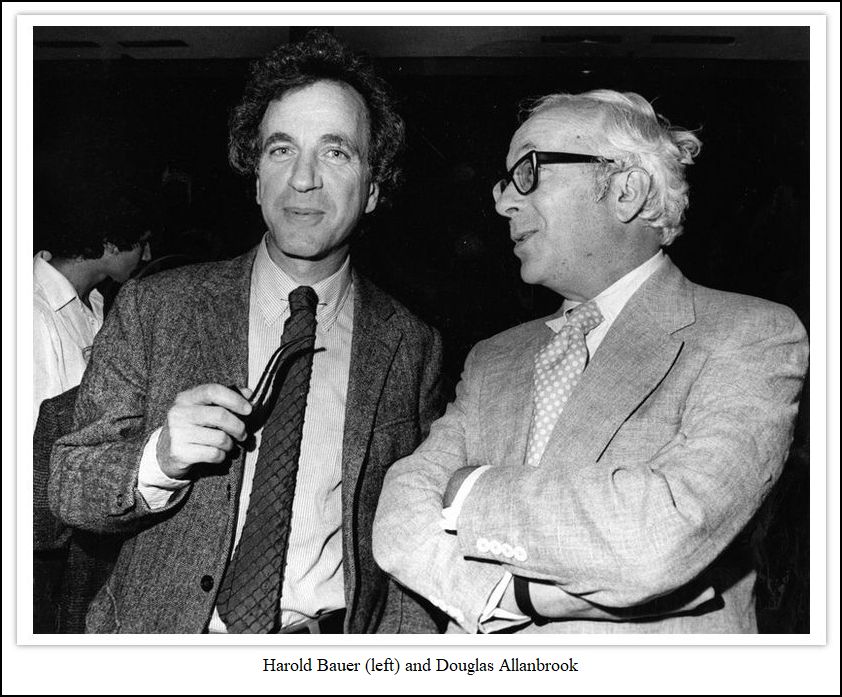
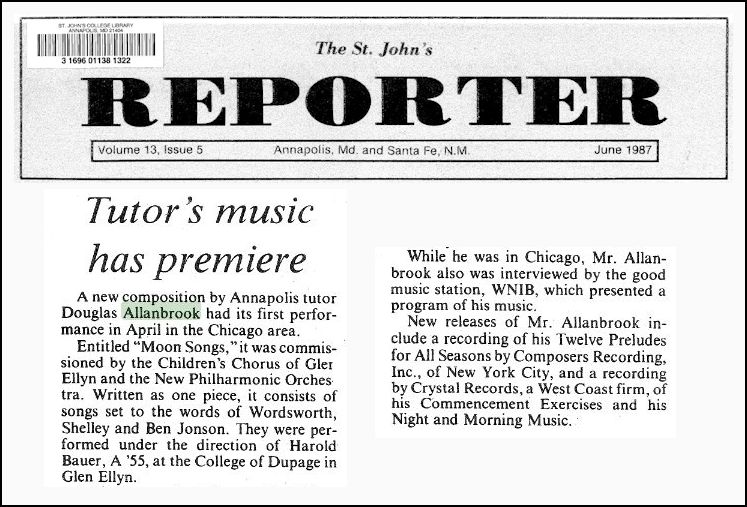
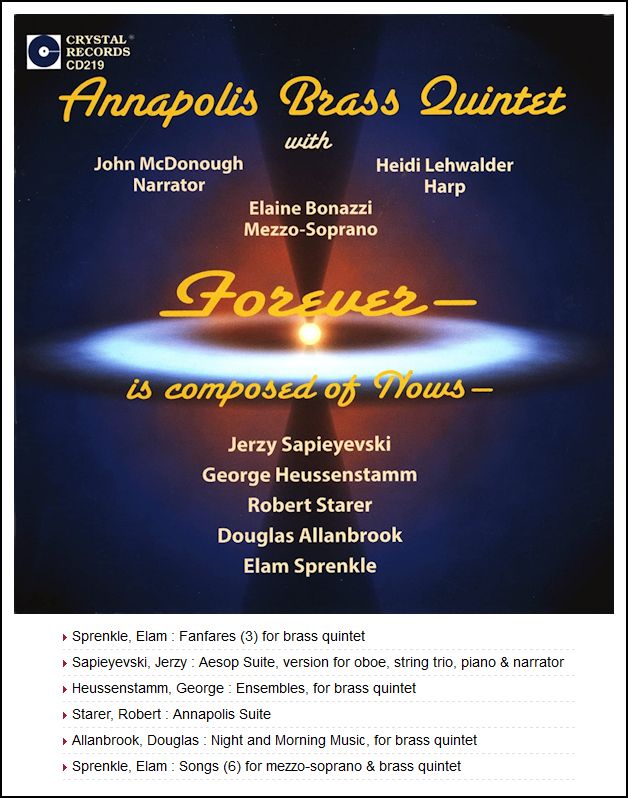 BD: Gentlepeople?
BD: Gentlepeople?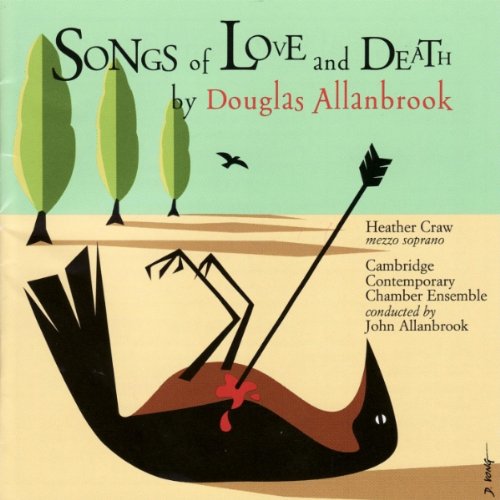 BD: Is composing fun for you?
BD: Is composing fun for you?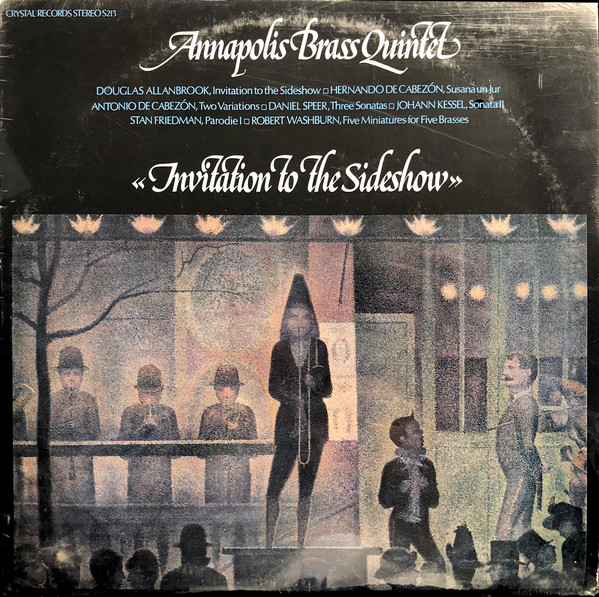 Allanbrook: Right. I have written
a lot of piano music, and quite a bit of harpsichord music because
I play a lot.
Allanbrook: Right. I have written
a lot of piano music, and quite a bit of harpsichord music because
I play a lot. 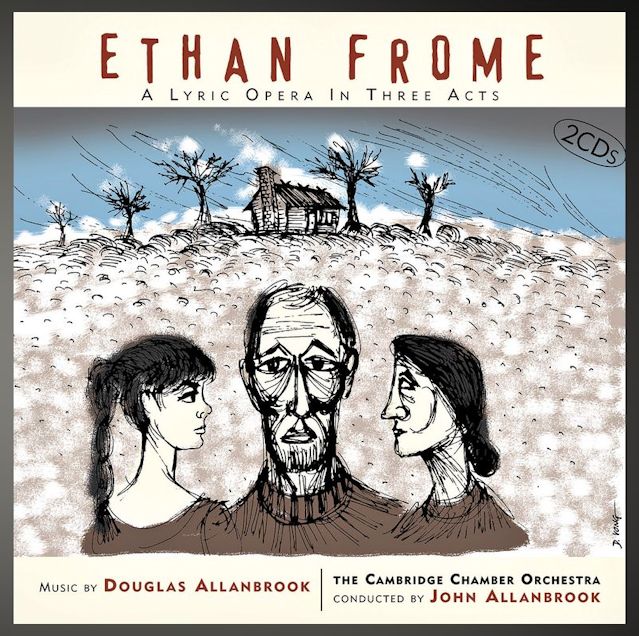 BD: What are the particular joys and pitfalls of writing
for the operatic voice?
BD: What are the particular joys and pitfalls of writing
for the operatic voice?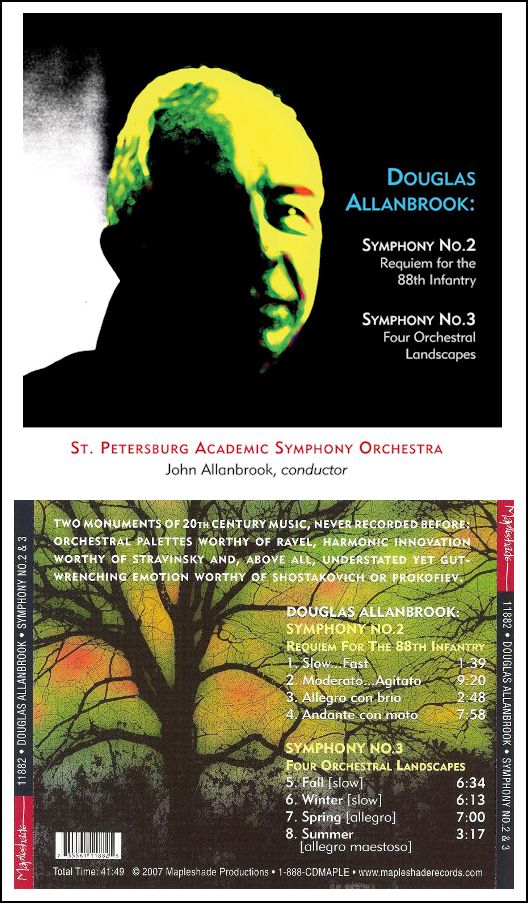 BD: What do you expect of the audience that comes to
hear one of your new pieces?
BD: What do you expect of the audience that comes to
hear one of your new pieces?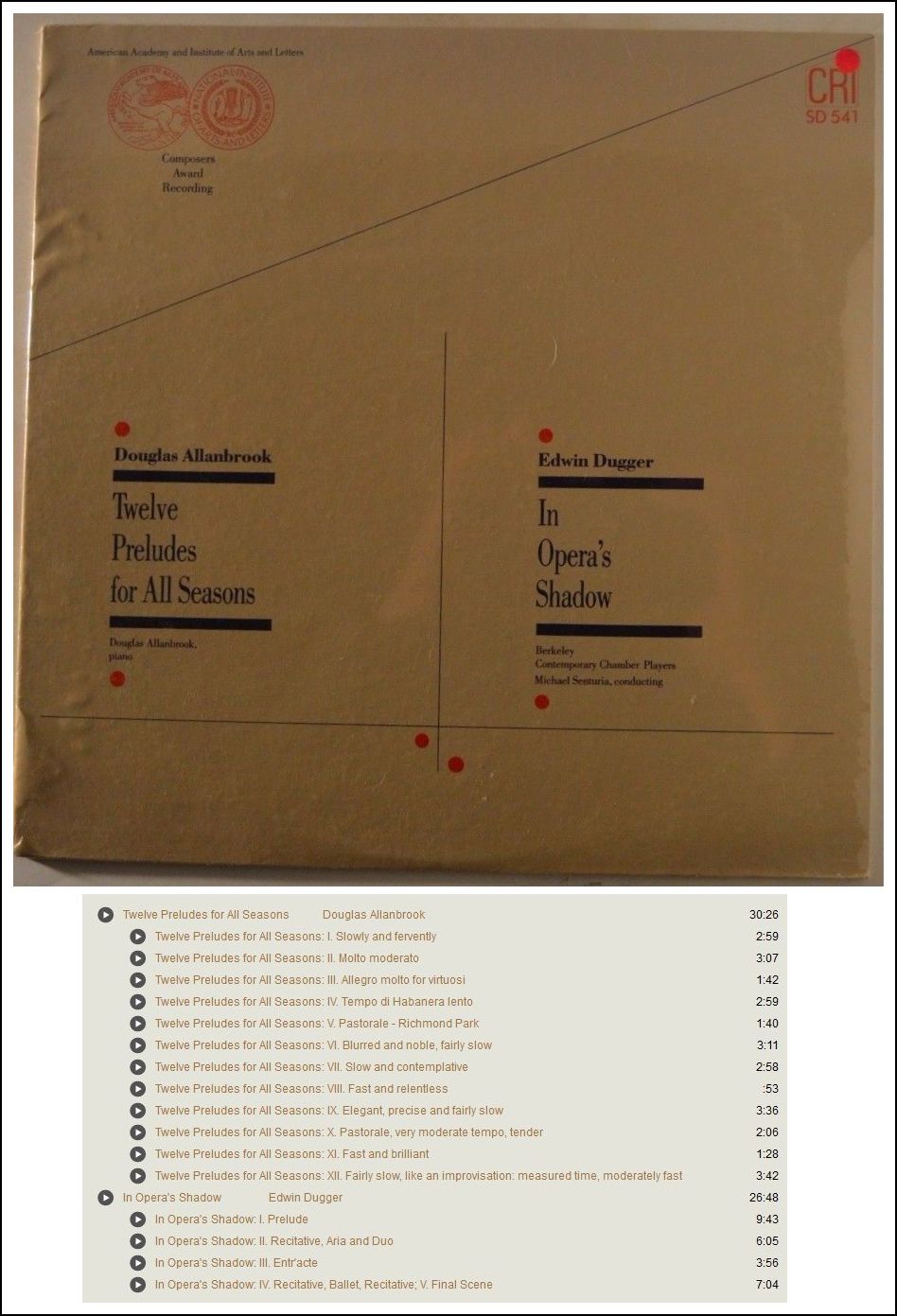
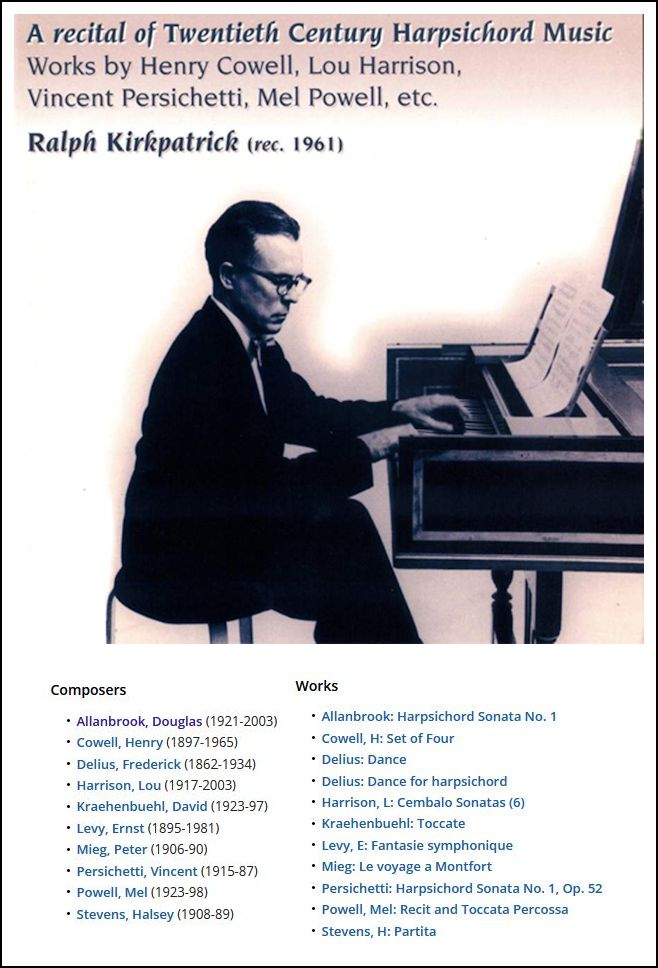 Allanbrook: The trouble is people seem
to think that it’s a thing you get a degree in, and if you’ve got a
degree in composition, you’re a composer. I don’t think people
should be encouraged to be composers. If they have a real
urge to do it, and a real talent, then they’ll do it. But I don’t
think getting a degree in it gives you any right to think you are a composer.
You’ve got to write music of deep feeling and craft, and if you can’t
do that, there’s no reason for you to do it. I remember in the
old days at Yale, Hindemith always used to get furious that everybody
had taken Harmony and then thought they were a composer. He did his
best in class to discourage them, as he’d work them so hard. But
it’s a funny business, because serious composers don’t have a career in
the usual way. That’s why I’ve been bad-mouthing universities, and
I shouldn’t. A lot of us have earned our livings
at it. I happen to be in this peculiar way of not having learned
it in a music department. Or, if you have an income of your own,
it’s nice and you never had to teach much. It’s lovely to have
that sort of freedom. On the other hand, sometimes you have to be
a little careful of being too detached from writing at the same time for
people who are going to play it, because the music’s often too complicated
to listen to, and it’s more to be respected than loved.
Allanbrook: The trouble is people seem
to think that it’s a thing you get a degree in, and if you’ve got a
degree in composition, you’re a composer. I don’t think people
should be encouraged to be composers. If they have a real
urge to do it, and a real talent, then they’ll do it. But I don’t
think getting a degree in it gives you any right to think you are a composer.
You’ve got to write music of deep feeling and craft, and if you can’t
do that, there’s no reason for you to do it. I remember in the
old days at Yale, Hindemith always used to get furious that everybody
had taken Harmony and then thought they were a composer. He did his
best in class to discourage them, as he’d work them so hard. But
it’s a funny business, because serious composers don’t have a career in
the usual way. That’s why I’ve been bad-mouthing universities, and
I shouldn’t. A lot of us have earned our livings
at it. I happen to be in this peculiar way of not having learned
it in a music department. Or, if you have an income of your own,
it’s nice and you never had to teach much. It’s lovely to have
that sort of freedom. On the other hand, sometimes you have to be
a little careful of being too detached from writing at the same time for
people who are going to play it, because the music’s often too complicated
to listen to, and it’s more to be respected than loved.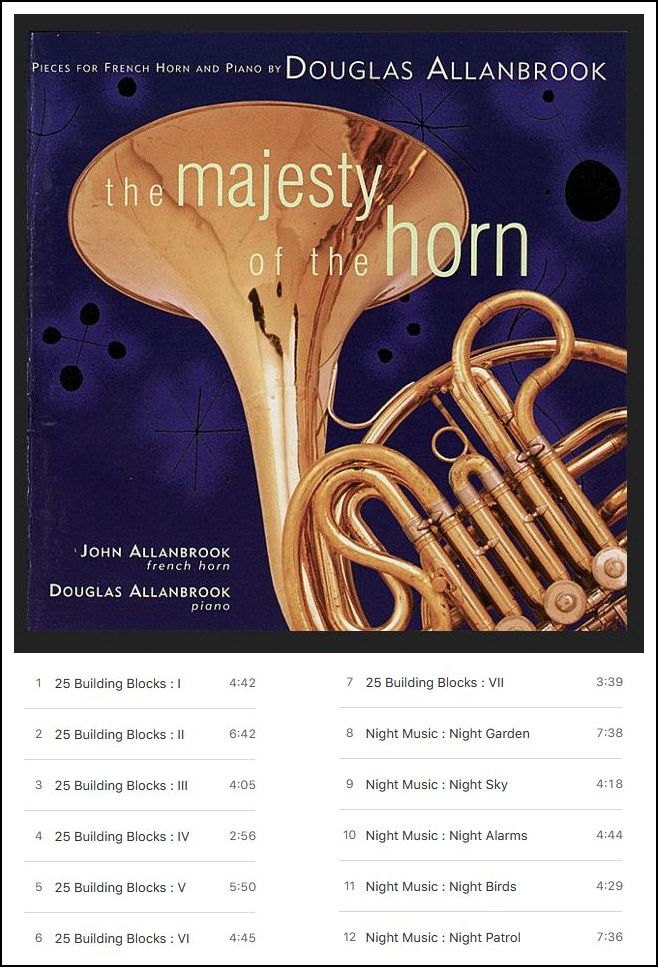 BD: Is that what made Mahler a particularly good at
orchestration, because he was always running an orchestra?
BD: Is that what made Mahler a particularly good at
orchestration, because he was always running an orchestra?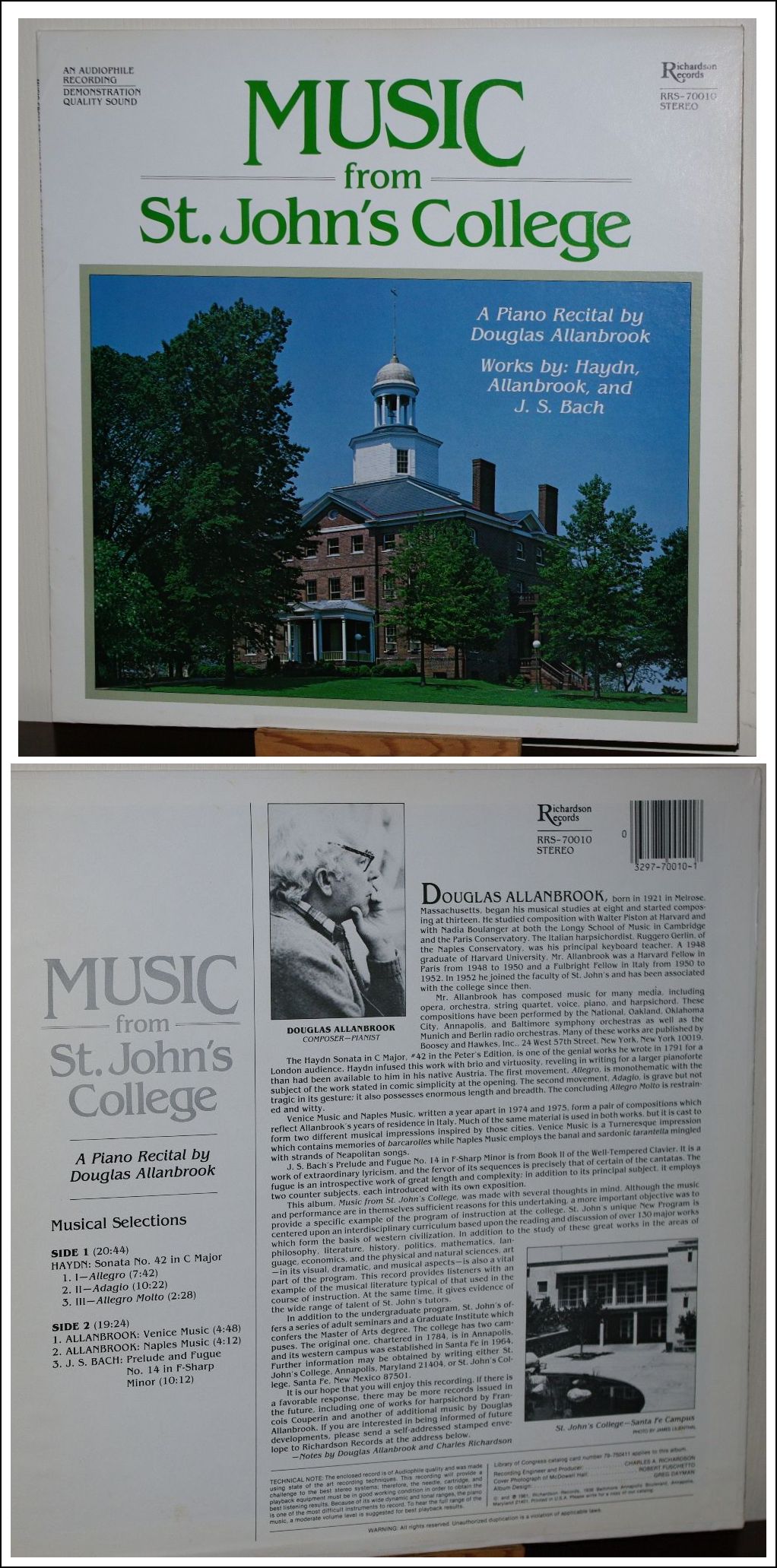
© 1987 Bruce Duffie
This conversation was recorded in suburban Chicago on April 27, 1987. Portions were broadcast on WNIB in 1991 and 1996; on WNUR in 2012 and 2015; and on Contemporary Classical Internet Radio in 2012. This transcription was made in 2020, and posted on this website at that time. My thanks to British soprano Una Barry for her help in preparing this website presentation.
To see a full list (with links) of interviews which have been transcribed and posted on this website, click here. To read my thoughts on editing these interviews for print, as well as a few other interesting observations, click here.
Award - winning broadcaster Bruce Duffie was with WNIB, Classical 97 in Chicago from 1975 until its final moment as a classical station in February of 2001. His interviews have also appeared in various magazines and journals since 1980, and he now continues his broadcast series on WNUR-FM, as well as on Contemporary Classical Internet Radio.
You are invited to visit his website for more information about his work, including selected transcripts of other interviews, plus a full list of his guests. He would also like to call your attention to the photos and information about his grandfather, who was a pioneer in the automotive field more than a century ago. You may also send him E-Mail with comments, questions and suggestions.